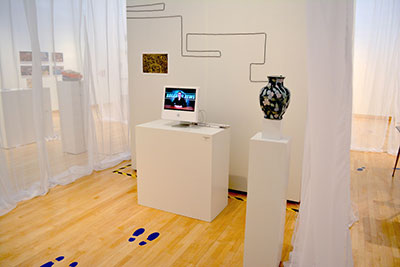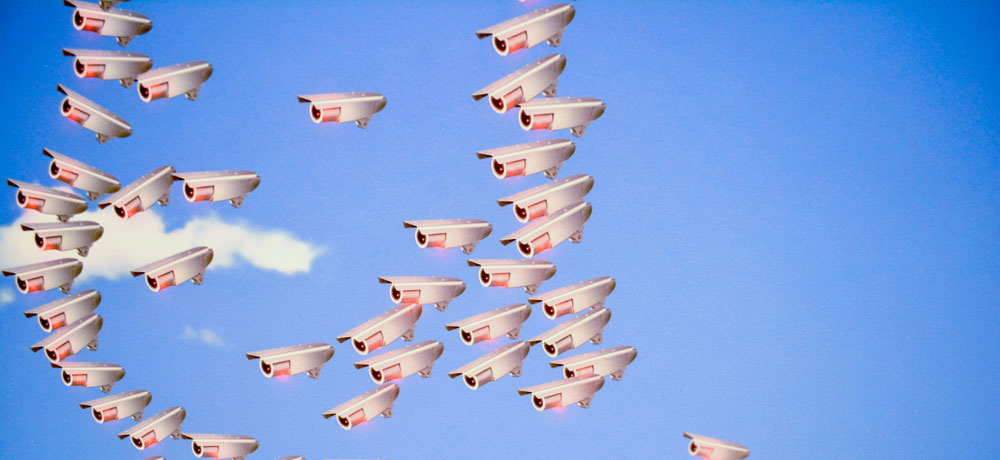Migration Detail, Sue Anne Rische, Photo Courtesy of Sue Anne Rische.
Sue Anne Rische’s Privacy World at Collin Arts Gallery

Prior to entering Sue Anne Rische’s exhibition Privacy World at Collin College Art Gallery, I was asked to sign a 9-page waiver. The last page asked for my name, address, date of birth, phone, email and frequently used passwords. I scribbled some fairly incomprehensible and fictitious information down, handed it to the security guard who was dressed in a secret service style black suitand walked inside.
Privacy World is a multimedia, interactive, satirical examination about our culture’s loss of privacy. Rische has orchestrated a complex series of gallery interactions, controlling how the viewer engages with each work. Blue footprints on the floor dictate the viewers’ directional flow, as well as the specific vantage point with which to contemplate each work. As someone who eschews authority at every opportunity, I refused to walk on the footprints.
The security guards weren’t packing heat, so I figured I was safe, but as I stood behind a pedestal showcasing a modicum-stickered box filled with texted and tweeted “secrets”, I heard a disembodied voice, akin to that of the great and powerful Oz. “COLETTE COPELAND IS NOT PLAYING BY THE RULES. REMOVE HER FROM THE GALLERY IMMEDIATELY.” I noticed the security guards spring into action and while ordinarily this might have concerned me, my nametag said Madame X.
As I continued through the exhibition, I noticed that near each viewing station was a “hidden” camera. Cameras were placed in a couch cushion, a stack of t-shirts, a purse, a plant, a pumpkin and my favorite—a coffee maker. Since viewers did not have access to the control station, the attendees did not know who was watching or what would happen to the resulting surveillance footage.
Along the gallery walls are digital prints showcasing Rische’s talent for seamless photo-shopping. My favorite series of digital prints feature security cameras. Attached to the back of the prints are red, blinking LED lights, giving the images an eerie, 3-D, kinetic quality. In Migration, the security cameras refer to both a flock of birds and military bombers.Nest continues with the reference to both birds and military insurgence.
Rische extends the play on words with the work My Gardening Disaster. In a seemingly banal, personal reflection on gardening, Rische embeds 65 NSA buzzwords. Viewers are invited to use an ink stamp (either visible or invisible) to identify the “dangerous” words. It proved to be a popular piece with which to interact as by the time I arrived, the poster was covered with stamps.
The one digital print series that didn’t make sense to me shows the artist eating salad in a variety of images. After an accommodating security guard enlightened me about the idea of memes, I understood the connection, but don’t think I would have decoded the idea on my own.
The funniest work on view addresses the ideas of art and terrorism. On one wall hangs a painting resembling one of Jackson Pollock’s. Across from the painting is a video about Rische arrested on terrorism charges based on encrypted messages found in her painting. In a humorous twist, Rische plays all three roles, newscaster, art critic and accused victim.
The exhibit ends with a mandatory competency awareness test. Seated at a desk with a 3-page exam, pencil and scantron, I briefly look at questions that waffle between serious and ridiculous. I was amazed at how many students comply, sitting for an additional 20 minutes to take a test. In the middle of my test, the voice of Oz boomed again, “When was the last time you changed your passwords?”
Upon completion, we were given a red envelope with our full-page evaluations. Mine was spot on. Here is an excerpt–“You are very creative, and have tried different avenues to utilize that ability. You are self critical and disciplined. You present something of a conundrum.” The assessment ended with the statement, “We specifically enjoyed observing you.”
On my way to the exit, I encountered one of my students who admitted to giving all of his REAL personal information including passwords in the waiver. “What were you thinking?” Clearly he was not.
In 2002, MIT published the book CTRL (SPACE): Rhetorics of Surveillance from Bentham to Big Brother. For a number of years, I used the essays and artists’ works as a teaching tool in my classes, educating art photography students about surveillance and imaging. During that period of history, we were still concerned with retaining our privacy and protecting ourselves against government control.
Continuing this mode of inquiry through parody and humor Rische’s project emphasizes the current public’s lack of discernmentconcerning the sharing of private information over social media, allowing companies to use their data as a marketing tool and our overall ignorance and/or apathy about our total loss of privacy and control. Within the plethora of campy puns, Rische’s project reveals a lot of information about privacy rights. We should take the time to read the fine print.
– COLETTE COPELAND

